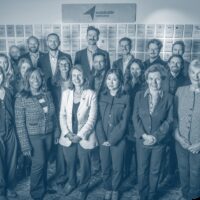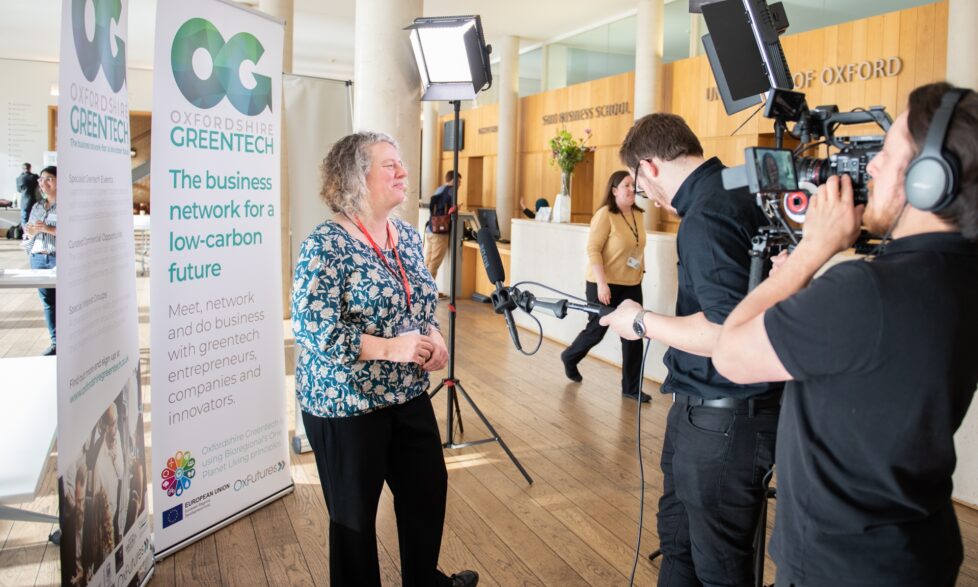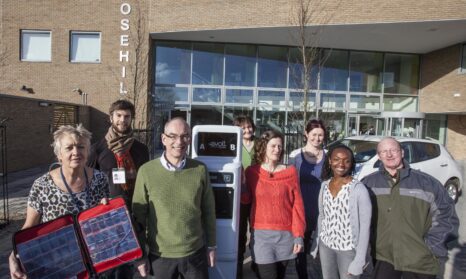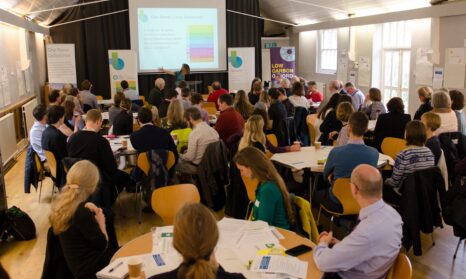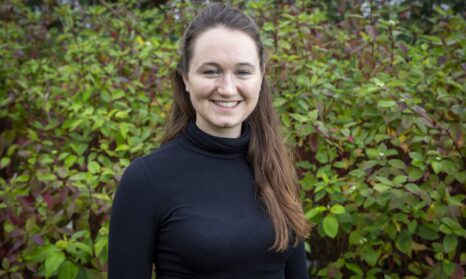Growing Oxfordshire’s low-carbon economy: reflecting on the legacy of OxFutures
OxFutures, which ran from April 2017 to March 2023, was an initiative backed by the European Regional Development Fund (ERDF). Its purpose was to grow Oxfordshire’s low-carbon economy in a way that benefits both people and planet.
It was delivered through a collaborative partnership between the Low Carbon Hub (LCH), Bioregional, and key stakeholders in Oxfordshire – the Environmental Information Exchange (EiE), Oxford Brookes University, Oxford City Council, Cherwell District Council, and the University of Oxford.
OxFutures supported SMEs in the region to:
- become ‘innovation active’ in the low-carbon sector,
- develop new low-carbon products and services, and,
- become more energy efficient.
Launching OxFutures was a challenge in itself. It took two years of partnership working to design an approach that met both the needs of Oxfordshire’s business community and ERDF’s stringent funding requirements. Bioregional served on the project board and went on to deliver key elements of OxFutures’ work.
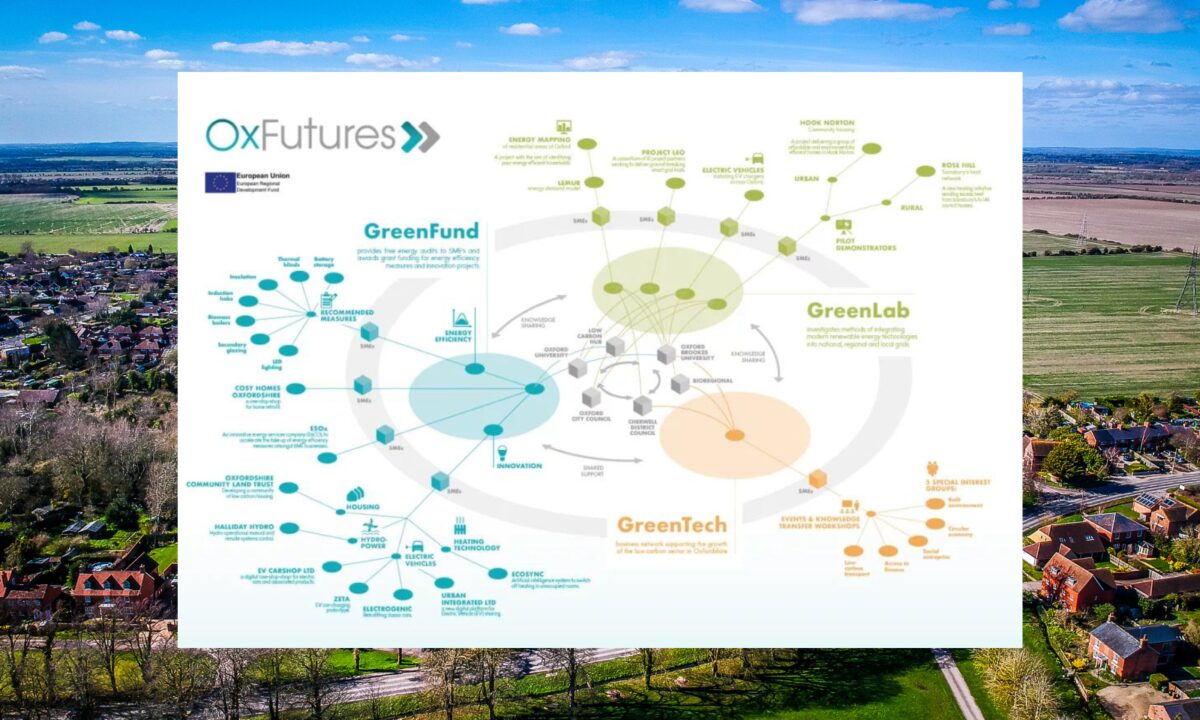
1. GreenLab
GreenLab investigated ways to integrate renewable energy technologies into national, regional, and local electricity grids. This was demonstrated through pilot case studies.
Bioregional led the urban pilot, which focused on developing a capital investment project, with options explored for renewable generation, neighbourhood-scale retrofit, electrical flexibility and storage, and use of waste heat for council housing in a neighbourhood of Oxford called Rose Hill.
OxFutures serves as a reminder of what can be achieved when ambitious partners come together to make things happen.
Building on a previous smart electricity project – Energy Resources for Integrated Communities (ERIC), where we supported the installation of solar panels and batteries on 82 homes, the Rose Hill primary school, and its community centre – we explored a model developed by Energy Local. This enabled local people to benefit from local, clean energy through local energy clubs, such as the ones we helped to set up in and around Brixton, South London. This research helped to lay the groundwork for a microgrid proposal by LCH.
This urban pilot led to a heat network feasibility study, which examined options for tapping into waste heat from a large Sainsbury’s superstore and piping this heat to hundreds of homes in Rose Hill. These studies made significant progress towards developing low-carbon energy solutions for both Rose Hill and provided a model that could be followed by other urban neighbourhoods.
LCH took on the rural pilot project, which aims to deliver affordable, energy-efficient community housing in the village of Hook Norton. Planning permission has been granted and the homes are under construction, with our partners Greencore Homes commissioned to complete the development.
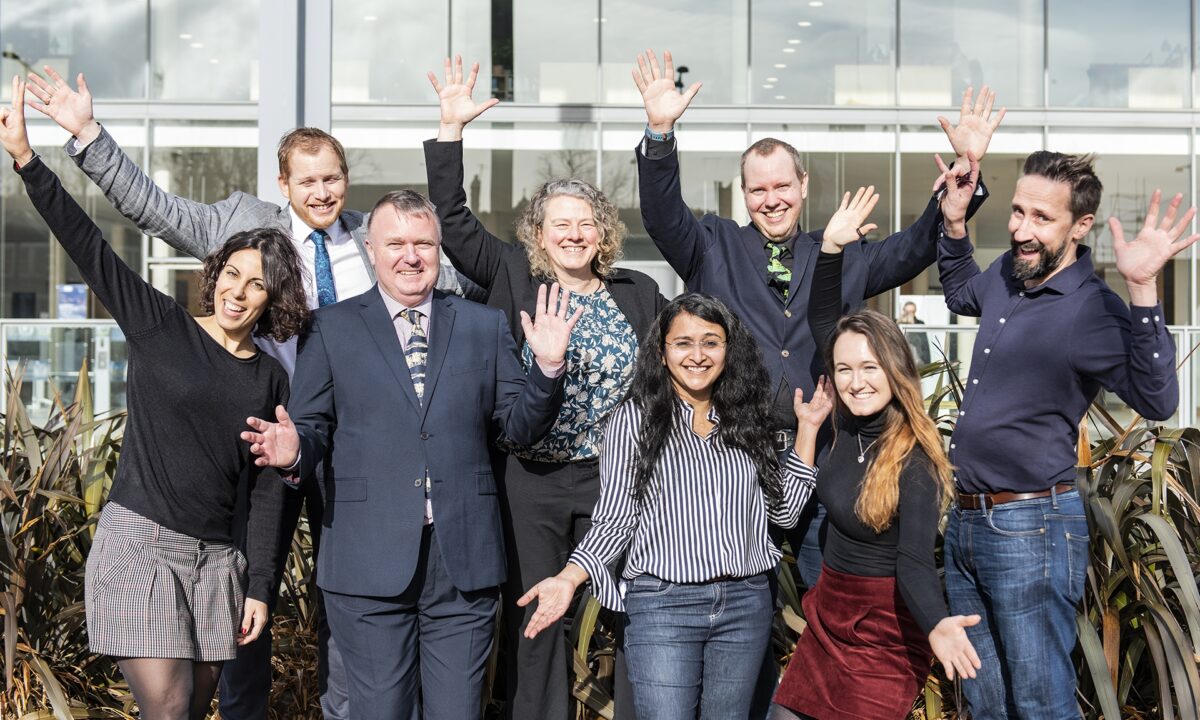
2. Greentech
One of the biggest legacies we directly helped to build was Oxfordshire Greentech, a low-carbon business network set up in partnership with Cambridge Cleantech in OxFuture’s second year. The idea stemmed from our consultation with local businesses, who identified they needed a business network that created opportunities for all organisations – both those already heavily involved in the low-carbon economy and larger organisations who aspired to be – to collaborate and share stories.
Six years on, the network goes from strength to strength, providing a valuable platform for representation, knowledge sharing, skills development, and coordination between Oxfordshire’s low-carbon businesses. Between April 2020 and March 2023, Oxfordshire Greentech held 54 events, from sustainability conferences to expert workshops and networking sessions, that attracted over 3,380 attendees. Today, the network has over 70 members ranging from lawyers and furniture retailers to architects and low-carbon energy businesses.
As our Head of Sustainable Business Lewis Knight recalled in his recent blog, establishing Oxfordshire Greentech was a daunting but incredibly rewarding challenge. The cherry on top is that one of our former employees, Hannah Scott, now leads the network as its first CEO.
Over £165,000-worth of grants were awarded to implement energy efficiency measures that allowed SMEs to cut their energy bills by an average of 19% a year, with annual cost-savings of £2,500.
3. GreenFund
The Environmental Information Exchange (EiE), a non-profit based at Oxford Brookes University, supports organisations to reduce their energy and water consumption. In the final part of the project, EiE conducted energy audits for 182 small businesses in the region, providing businesses with personalised, detailed, and costed recommendations to save energy and reduce bills.
Led by LCH, a grant-giving process was established called the GreenFund to support SMEs to implement the energy audit recommendations, to support low carbon innovation (developing new business ideas, products and new services that can grow the low-carbon economy), and to set-up eight new low-carbon businesses. Bioregional served on the GreenFund board, advising on each grant award.
Over £165,000 of grants were distributed, enabling businesses to cut their energy bills by an average of 19% a year, with annual cost-savings of £2,500. As well as the financial benefits, SMEs achieved collective savings of over 2,000,000 kWh of electricity and gas, leading to savings of 976 tonnes of CO2.
Over £400,000-worth of grants were awarded to boost low-carbon innovation, with over £65,000 of this distributed to not-for-profit organisations that could reinvest the money saved into their community work. Carbon savings from these innovations amounted to 875 tonnes.
We’re reducing our CO2 emissions by roughly 3.52 tonnes/year and save around £5,000/year on energy bills. This means we’ll be able to invest more in what we love doing – supporting families, running community events, and working with the OX4 food crew to tackle food insecurity.
Flo’s in the Park
OxFutures started as a three-year project but was extended by another three years after winning additional funding from the ERDF. Though it only ran for six years, OxFutures provided a massive boost to the low-carbon ecosystem in Oxfordshire and created a world-leading example of how to create a thriving, zero carbon economy. It’s inspiring to reflect on the impact it has generated, and that its legacy still lives on. Tackling the climate crisis is a significant challenge, but OxFutures serves as a reminder of what can be achieved when ambitious partners come together to make things happen.
You can read more about OxFuture’s impact in the OxFutures Social Impact Report.
